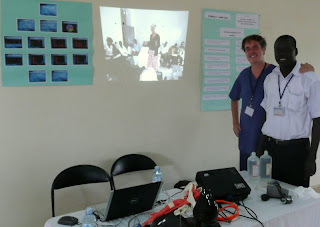
We did a research project a couple of weeks back in JTH looking at the distribution of mortality in the hospital. We were particularly interested in not only who was dying but also when they were dying. As you may know my professional interest is in acute care, and this is very much the area where David and I are focussing our attention here in Juba. We wanted to know if we were barking up the wrong tree in terms of making a dent in total hospital mortality rates. We aren’t. In fact, we clearly demonstrated that >60% of hospital mortality (and >70% in paeds) occurs within 24 hours of admission. Anyway we’re writing this up at the moment.
There’s a massive convention on at the moment called the Government of Southern Sudan Health Assembly 2 (GOSSHA2) which is the second annual health assembly where representatives from over 40 NGOs (national and international) all get together with the whole MoH/GoSS and State Government representatives to talk, present and generally make important decisions concerning national health strategy. The theme is ‘Building Effective Health Systems in Southern Sudan.’ The whole thing was opened by the President of Southern Sudan, so basically it’s quite a big deal.
I’m still not quite sure how it happened, (but probably it’s due to the fact that our work is in Juba and JTH’s heavily involved with MOH) we ended up acquiring a slot at the exhibition where we could do a poster presentation of the research and also generally tell folk about what we’re up to here.
 I generally do the photography which is why I'm not in many of them, and I completely forgot to photograph myself at our stand. However, our nextdoor neighbour was very keen to photograph me at his stand and it's the closest I have!
I generally do the photography which is why I'm not in many of them, and I completely forgot to photograph myself at our stand. However, our nextdoor neighbour was very keen to photograph me at his stand and it's the closest I have!Anyhow today at GOSSHA2 the Director General for Curative Services in MoH (who’s our Boss in GoSS as it were) was doing an address on ‘building an effective referral system’ and invited me to present the research findings to the assembly as part of his time slot. So Dr Dario (my Surgical Consultant and Director General of JTH) introduced me and off I went. On reflection it was actually quite relevant to the theme; part of an effective health system involves secondary/tertiary care, and what we’ve shown is that to make that hospital care more effective (at least in terms of reducing mortality) you need to focus on the acute care service delivery. I got some positive feedback afterwards too which was encouraging.

 Here's a couple of shots of the presentation. You may just be able to make out the graphs - the red bar is <24h mortality
Here's a couple of shots of the presentation. You may just be able to make out the graphs - the red bar is <24h mortalityIn other news, we bade farewell to the senior team from St Mary’s last Saturday. I know everyone in Juba was extremely grateful for their input in JTH over the 3 weeks they were here: they’ll certainly be missed, and I’d like to think they had a great time too. We had a great meal out on the Nile with a load of the hospital folk and also some people from MoH on Friday which was a real treat. Highlights for me included an African jazz band which featured a vocalist who sounded just like Louis Armstrong and the chance to eat a large steak. Anyway, life is back to relative normality (for Juba) again and now it’s just David and I plodding ever onwards...
James
















